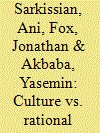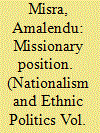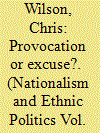| Srl | Item |
| 1 |
ID:
108932


|
|
|
|
|
| Publication |
2011.
|
| Summary/Abstract |
This article examines the emergence of a neo-Biafran movement, known as, the Movement for the Actualization of the Sovereign State of Biafra (MASSOB) in Nigeria. Drawing on a prior idea of statehood, the advent of MASSOB marks a shift in the tenor of ethnic nationalism by virtue of the fact that the movement entirely rejects a state-led process and demands the creation of an independent state of "Biafra." The analysis dissects the change in the tempo of contemporary Igbo nationalism and identifies the need for a major restructuring of the Nigerian state in order to forestall the possibilities of other ethno-nationalist claims becoming uncompromisingly separatist.
|
|
|
|
|
|
|
|
|
|
|
|
|
|
|
|
| 2 |
ID:
108934


|
|
|
|
|
| Publication |
2011.
|
| Summary/Abstract |
This study focuses on explaining the variation in the treatment of religious minorities in Muslim-majority countries using a novel dataset on religious discrimination-the Religion and State-Minorities (RASM) Dataset. As few theories exist to explain the causes of religious discrimination, this study compares theories related to general religion-state relations based on ideology, culture, and rational choice. We find that while political and structural factors are important in explaining variation in levels of discrimination across Muslim countries, ideational factors may help to explain why certain minority groups appear to be targeted more than others within individual countries. Regional and cultural differences in levels of discrimination exist across the Muslim world, and the identity of the religious minority group matters in determining why some groups face greater repression than others. We argue that knowing the targets of discrimination is important in developing theory about the causes of it.
|
|
|
|
|
|
|
|
|
|
|
|
|
|
|
|
| 3 |
ID:
108930


|
|
|
|
|
| Publication |
2011.
|
| Summary/Abstract |
This article applies the concept of the societal security dilemma to ethnic relations in Israel. I argue that Jews and Arabs in Israel are locked in a regular societal security dilemma in which their identity security requirements are incompatible and that the peace process between Israel and the Palestinian Authority has only served to exacerbate that incompatibility. The article highlights the process of securitization of identities, which is generally missing from the discussion of the Israeli-Palestinian conflict and ethnic relations in Israel.
|
|
|
|
|
|
|
|
|
|
|
|
|
|
|
|
| 4 |
ID:
108928


|
|
|
|
|
| Publication |
2011.
|
| Summary/Abstract |
The purpose of this article is to critically examine the politics of religious conversion in India. Since Christianity is the main religion espousing and conducting conversion in ever-larger numbers in India, my focus, in the following pages, is to interrogate the debate surrounding this particular undertaking and the attendant conflict dynamics. This study is organized according to the following framework. First, it situates religious conversion in the context of radical Hindu nationalism. Second, it explores the issue of religious conversion in the theories of identity and globalization. Third, it probes the specifics of Christian conversion in India and investigates the issue within the framework of identity politics and secularism. Fourth, it examines the response and reaction of the radical Hindu nationalists towards religious conversion in general and Christian conversion in particular from the perspective of ethno-religious nationalism. Fifth and finally, it evaluates the dimensions of conflict between Christians and Hindus and how they are played out in the shared social arena.
In conclusion, this article stresses that religious conversion in India is a form of a socioeconomic emancipatory undertaking. Those who feel stifled by the discriminatory caste order prevalent within Hinduism and live a marginal existence embrace this new identity. In the same breath it argues that Christianity in general, and Christian missionaries in particular, have courted criticism, opposition, and violence from radical Hindus, informed citizenry, and the institution of the state, as they are considered an "external other"-accused of undermining the complex sociopolitical order in the country.
|
|
|
|
|
|
|
|
|
|
|
|
|
|
|
|
| 5 |
ID:
108927


|
|
|
|
|
| Publication |
2011.
|
| Summary/Abstract |
Why people follow the incitement of powerful individuals to participate in collective violence remains one of the most intriguing questions in the study of conflict. By using process-tracing to analyze in detail a violent ethno-religious conflict in Indonesia, this study concludes that rioters are often not provoked by elite propaganda but rather are acting out of their own interest. However, their violence sets off a chain of events that causes large-scale communal conflict. This escalation is most likely in the presence of three causal mechanisms: the immobilization of local security forces; widespread sentiments of sympathy for innocent victims; and the creation of intense feelings of insecurity.
|
|
|
|
|
|
|
|
|
|
|
|
|
|
|
|